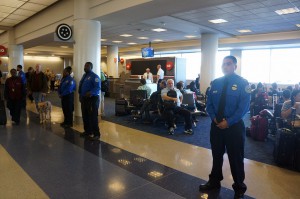Should the TSA keep their Behavior Detection Officers?

Behavior Detection Officers looking for suspicious behaviors. From Chris Sloan.
According to the Government Accountability Office (GAO), the Transportation Security Administration (TSA) spends around $200 million a year on a behavioral-detection program that many believe is ineffective.
The job of a behavior detection officer
A behavior detection officer (BDO) is a TSA agent trained to identify suspicious behaviors, such as fidgeting, excessive sweating, and wearing heavy clothes in a warm climate. Each BDO goes through an annual training course which consists of five days in a classroom and two days of on-the-job training.
Once trained, the officers walk through airports and converse with passengers to identify suspicious behavior.. The TSA emphasized that the BDOs are not looking for those who are in a hurry, rather 94 different suspicious behavior indicators given to them by the FBI. If an officer believes someone could be a potential risk, they refer them to local law enforcement. The local law enforcement then has the authority to make an arrest, investigate, or deny boarding.
Statistics from the behavioral-detection program
- The behavioral-detection program consists of about 3,000 trained BDOs, in 176 airports throughout the U.S.
- In 2013 alone, BDOs referred more than 2,100 passengers to local law enforcement, resulting in:
- 181 arrests
- 79 investigations
- 20 boarding denials
- 1.6 referrals to local law enforcement per 160 hours worked
Criticism of this program
The two main issues with the behavioral-detection program are subjectivity and racial profiling. Obviously, what one BDO considers a suspicious behavior, a different BDO may not. According to research done by the GAO, 21 of the 25 BDOs interviewed believed some behavior indicators are subjective. Additionally, of those 25 interviewed BDOs, five stated that they believe racial profiling occurs.
In August of 2012, eight BDOs contacted the American Civil Liberties Union (ACLU) with concerns that their colleagues were racially profiling passengers. They believed their colleagues were targeting minorities in hopes that they would have immigration issues, which wouldincrease the BDOs’quotas. However, the ACLU had no case against the BDOs because the TSA does not record information on race of those referred to law enforcement.
My two cents
Although subjectivity and racial profiling are major issues, keeping airlines safe is an even more important issue. The use of BDOs has enhanced passenger safety. Those 181 passengers referred by BDOs and arrested in 2013 may have been capable of causing another U.S. tragedy if they had been able to board a plane. And while $200 million sounds like a great deal of money, put in perspective, it’s only 2 percent of the TSA’s total annual budget. Keep the BDOs and increase airport safety!
Like this topic? Check out our related products:
Category: Surveillance

















